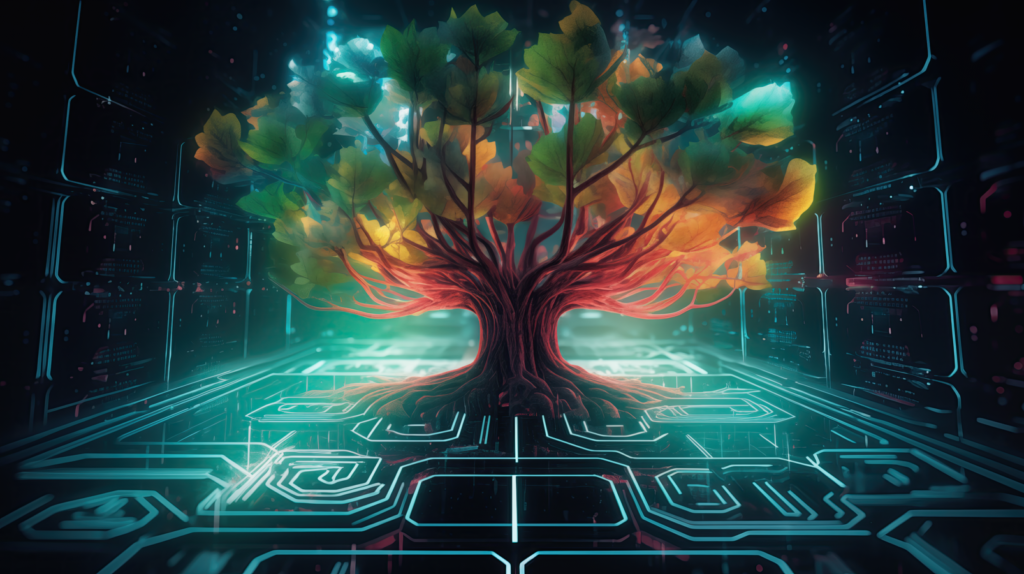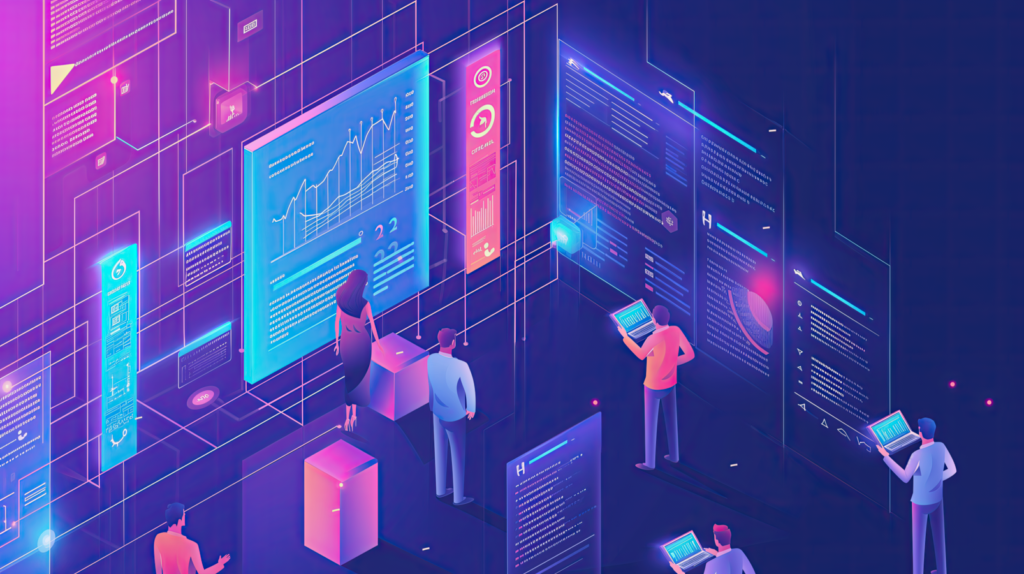Intruduction
Integrating Artificial Intelligence (AI) in the creative process is a pivotal shift, marking a significant development in AI content optimization. Rather than supplanting human creativity, AI-powered tools, including deep-learning algorithms, unlock the potential to augment it. These technologies can produce original content across various mediums—text, images, video, and audio—ushering in a new era of creativity. This integration of AI in content creation underscores a transformative approach to enhancing content quality and engagement, leveraging the unique capabilities of AI to complement and elevate human ingenuity.
It is predicted that AI-generated content (AIGC) will account for a significant percentage of all data by 2025, increasing the volume of data created. However, humans remain indispensable in this AI-driven creative process. AI cannot replicate human creativity and originality, especially when creating content that resonates emotionally with audiences. Humans are adept at applying contextual understanding, ensuring quality assurance, and navigating ethical considerations – areas where AI still faces limitations.
The collaboration between AI and humans is crucial for the creative process. AI can handle repetitive tasks and analyze data, while humans focus on strategic, innovative aspects and maintain quality control. This complementary relationship aims to boost efficiency, foster business growth, and push the boundaries of what’s possible in content creation, all while keeping humanity at the core of creativity.
The future of content creation is not about choosing between AI and human creativity but about integrating the strengths to produce engaging, innovative, and profoundly human content.
Table of Contents
AI Elevates the Need for a Great User Experience
Artificial Intelligence (AI) revolutionizes user experience (UX) by personalizing interactions and simplifying navigation across digital landscapes. AI’s capability to process and analyze vast amounts of user data enables the delivery of customized content and interfaces, directly responding to individual user behaviors, preferences, and interests. This AI content optimization personalization enhances user engagement and significantly improves conversion rates and user satisfaction.
Moreover, AI aids in automating routine tasks, freeing UX designers to focus on more strategic elements of design that require creativity and innovation. By identifying behavioral patterns through data analysis, AI content optimization helps designers and marketers understand their audience better, leading to more informed decisions and a user-friendly, relevant solution.
In essence, the integration of AI in UX design offers a dual advantage: it enriches the user’s interaction with digital products while optimizing the design process to be more efficient and impactful. As AI technology continues to evolve, its role in enhancing the user experience through AI content optimization will become increasingly critical, pushing the boundaries of personalized and intuitive digital environments.
Read More: New Report Reveals the Top AI Content and SEO Trends for 2024
AI Drives Personalization and Authenticity
AI-driven personalization represents a transformative approach to content creation and user engagement, enabling a previously unattainable customization level. By leveraging AI content optimization, companies can automate the process of content generation and content matching, tailoring communications to individual customers with unprecedented precision. This capability enhances customer centricity and promises significant revenue boosts, potentially generating hundreds of billions globally over the next decade. The essence of AI in personalization lies in its ability to analyze user data, including preferences and behaviors, to deliver content that genuinely resonates on a personal level.
Moreover, AI content optimization has significantly improved user engagement, customer retention, and conversion rates. For example, platforms like Spotify and Netflix utilize AI to offer personalized content recommendations, enhancing user satisfaction and engagement. Such AI-driven strategies allow for dynamic adaptation of content and recommendations, presenting users with options that closely align with their interests and past behaviors.
Incorporating AI into personalization strategies enables businesses to connect with their audience more effectively through AI content optimization, fostering authenticity and building more robust; utilizing AI for personalization empowers businesses to better engage with their audience by optimizing content, creating genuine connections, and establishing stronger customer relationships. AI-powered personalization is revolutionizing content customization and improving how brands interact with customers. Experience the future of content personalization and elevate your user engagement today! meaningful customer relationships. The future of content personalization, powered by AI, promises to elevate the user experience and redefine how brands interact with their consumers individually.
Related Article: Ultimate Showdown: The Best Laptops for Deep Learning Revealed

AI as a Catalyst for Organic Growth
AI-generated content significantly transforms business strategies, enhancing content creation’s efficiency and impact on organic growth through AI content optimization. By automating the production of engaging, personalized content, AI enables businesses to scale their content strategies efficiently. This streamlines the creation process and improves the content’s quality and relevance, making it more resonant with target audiences.
Integrating AI in content creation offers a dual advantage: it significantly reduces the time and resources required for content production, and it enables businesses, especially SMEs, to scale their content output without proportionally increasing their workload. This scalability is crucial for maintaining a consistent online presence and engaging with a broader audience through AI content optimization.
Moreover, AI-generated content enhances a business’s SEO and online visibility. Through keyword optimization and trend analysis, AI tools identify and incorporate relevant keywords and phrases, improving a website’s search engine ranking and attracting more organic traffic through AI content optimization. This improved SEO performance contributes directly to a business’s organic growth, enhancing its competitiveness in the digital marketplace.
In conclusion, AI-generated content is not just about automating content creation; it’s about revolutionizing how businesses approach marketing and communication through AI content optimization. By harnessing AI’s power, companies can produce more personalized, relevant, and engaging content, driving organic growth and strengthening their market position.
Content Optimization with AI – 10 Effective Approaches
Integrating AI in content optimization revolutionizes how digital content is crafted and delivered, offering efficiency and precision in engaging target audiences through AI content optimization. Here are ten practical approaches to leveraging AI for enhancing content optimization:
- Goal Definition and Strategy Alignment: Utilize AI content optimization to analyze business objectives and tailor content strategies that align with these goals. AI can help identify the most impactful content types and channels for reaching your audience.
- Data-Driven Insights for Content Planning: AI tools can sift through large volumes of data to uncover insights on audience preferences, engagement patterns, and content performance through AI content optimization. This aids in creating a data-informed content calendar that resonates with your target audience.
- Advanced Keyword Research: AI-powered SEO tools can perform comprehensive keyword research, uncovering long-tail keywords and semantic variations that improve content visibility and search engine ranking through AI content optimization.
- Content Generation and Ideation: AI can assist in generating content ideas and even drafting initial content versions, speeding up the creation process while ensuring relevance and quality through AI content optimization.
- Maintaining Originality and Avoiding Plagiarism: AI plagiarism checkers ensure content uniqueness, a crucial factor for SEO and credibility through AI content optimization.
- SEO Analysis and Optimization: AI tools can analyze content for SEO friendliness, suggesting improvements for better SERP rankings, such as optimal keyword density, meta tags, and internal linking strategies through AI content optimization.
- Personalization at Scale: AI enables personalization of content at scale, tailoring messages and recommendations to individual user behaviors and preferences, significantly enhancing user engagement through AI content optimization.
- Multilingual and Global Content Strategy: AI facilitates creating and optimizing content in multiple languages, enabling businesses to reach a global audience with localized and culturally relevant content through AI content optimization.
- A/B Testing for Content Effectiveness: Employ AI for A/B testing different content formats, headlines, and CTAs to determine the most effective strategies for engaging your audience and driving conversions through AI content optimization.
- Continuous Learning and Optimization: AI systems continually learn from user interactions, feedback, and performance data, enabling ongoing optimization of content strategies for better outcomes through AI content optimization.
By integrating these AI-driven approaches, businesses can significantly enhance their content optimization efforts through AI content optimization, driving better engagement, higher SEO rankings, and improved conversion rates. This strategic application of AI streamlines content production and ensures that content is more relevant, engaging, and effective in achieving business goals through AI content optimization.
The Four Stages of AI Content Optimization
AI Content Optimization is increasingly becoming a cornerstone for successful digital marketing strategies in the rapidly evolving digital landscape. This process can be broadly divided into four critical stages, each significantly enhancing content’s reach, relevance, and impact.
- Discovery: At this initial stage, AI tools are employed to uncover insights about audience preferences, trending topics, and content performance. This involves analyzing large datasets to identify content creation patterns and opportunities that resonate with the target audience.
- Creation: Leveraging AI in the creation phase allows for the generation of content that is both relevant and engaging. AI-driven content creation tools can assist in drafting articles, creating images, and even producing video content that aligns with the discovered insights, saving time and resources while maintaining high-quality standards.
- Optimization: Once the content is created, AI is crucial in optimizing it for search engines and user engagement. This involves using AI for keyword optimization, content structuring for SEO, and personalization to match the user’s intent and preferences, ensuring that the content reaches its intended audience effectively.
- Promotion: In the final stage, AI aids in strategically promoting content across various channels. This includes determining the best times to post on social media, identifying the platforms where the content will perform best, and automating the distribution process to ensure maximum visibility and engagement.
By integrating AI tools throughout these stages, businesses can achieve a more efficient and effective content strategy. This enhances the content’s ability to attract and engage users and drives better SEO results and overall online presence, making AI an indispensable ally in digital marketing.

Tools That Can Help With Content Optimization
The content creation and optimization landscape is rapidly evolving, with AI playing a pivotal role in reshaping strategies for better SEO and user engagement. Here’s an overview of AI and non-AI tools that are at the forefront of content optimization in 2024:
AI Content Creation and Optimization Tools
- Writesonic: Ideal for generating blog posts, social media content, and product descriptions, Writesonic offers various writing styles and tones, allowing customization to suit brand voice.
- Copy.ai: Specializes in creating persuasive marketing copy, including email campaigns and landing pages, leveraging AI to craft compelling headlines and product descriptions.
Content Optimization Tools
- MarketMuse: Uses AI to analyze content and suggest optimizations for SEO, helping create comprehensive, search-friendly articles.
- Clearscope: Provides insights into the competitive content landscape, offering recommendations to enhance content quality and SEO performance.
- Surfer SEO: A comprehensive tool offering data-driven recommendations for content optimization, including keyword usage and content structure.
Content Curation Tools
- Curata: Aggregates content from multiple sources for easy filtering, categorization, and publishing.
- Scoop. It: Helps discover and curate content based on interests and target audience, with templates and social media integration.
- ContentStudio: Combines content discovery, planning, and publishing features, allowing for efficient content curation and social media scheduling.
Visual Content Creation Tools
- Canva: A user-friendly design tool offering templates, fonts, and images for professional graphics.
- Adobe Spark: Provides a platform for creating graphics, web pages, and videos with customizable templates and animation features.
- Piktochart: Specializes in infographics and presentations, featuring a drag-and-drop interface and a vast library of design elements.
Social Media Management Tools
- Hootsuite: Supports scheduling posts, monitoring conversations, and analyzing performance metrics across multiple platforms.
- Buffer: Simplifies scheduling and publishing social media content with analytics to optimize performance and engagement.
- Sprout Social: Offers advanced scheduling, social listening, and detailed reporting to streamline social media strategies.
Conclusion
These tools, both AI and non-AI, represent the cutting edge of content optimization, offering solutions for creating, enhancing, and distributing content across various platforms. Whether generating engaging copy, optimizing for SEO, curating relevant content, designing visuals, or managing social media presence, these tools equip content creators with the capabilities to adapt and excel in the dynamic digital landscape of 2024.
The integration of AI in content optimization heralds a transformative era for digital marketing, merging human creativity with the efficiency of technology. From empowering human-centric content creation to enhancing user experience and personalization, AI tools offer a spectrum of opportunities for businesses to elevate their content strategies. Coupled with traditional SEO practices and innovative social media tactics, these advancements underscore a strategic pivot towards more engaging, authentic, and optimized digital content. As we navigate through 2024 and beyond, embracing AI’s capabilities while maintaining the human touch will be vital in crafting compelling narratives and driving organic growth in the ever-evolving digital landscape.


Pingback: ChatGPT Paraphrase: Is It Essential for Content Creation in ? 2024
Pingback: Samsung Galaxy Tab A9+ 10.9 Review: Features, Performance, and Choice